
-
 Donald excited Europe handled raucous crowd well at Ryder Cup
Donald excited Europe handled raucous crowd well at Ryder Cup
-
Goals, guns and narcos: Hitmen plague Ecuador's beautiful game

-
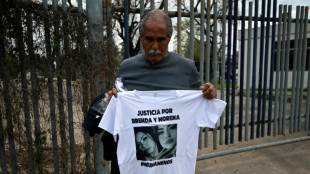 Argentine victims of live-streamed murder laid to rest on eve of protest
Argentine victims of live-streamed murder laid to rest on eve of protest
-
No USA Ryder Cup panic as fightback enters Bradley's plan

-
 USA turns to Scheffler, DeChambeau in Saturday foursomes
USA turns to Scheffler, DeChambeau in Saturday foursomes
-
Trump can't spark US comeback in visit to Ryder Cup

-
 Trump urges Microsoft to fire ex-Biden administration official
Trump urges Microsoft to fire ex-Biden administration official
-
Europe takes three-point Ryder Cup lead as US gets no Trump boost

-
 Three talking points ahead of the Women's Rugby World Cup final
Three talking points ahead of the Women's Rugby World Cup final
-
Murillo sends Marseille top in Ligue 1 with late win in Strasbourg

-
 Kimmel boycott ends as US TV companies put him back on air
Kimmel boycott ends as US TV companies put him back on air
-
Kane scores twice to reach 100 Bayern goals in record time

-
 'Almost impossible': Brazilian skater Sandro Dias makes history on mega ramp
'Almost impossible': Brazilian skater Sandro Dias makes history on mega ramp
-
Trump targets more opponents after 'dirty cop' Comey

-
 Sixers' Embiid eyes consistency after injury-plagued NBA season
Sixers' Embiid eyes consistency after injury-plagued NBA season
-
More questions than answers surround Trump's TikTok deal

-
 Iran sanctions look set to return as last-ditch UN push fails
Iran sanctions look set to return as last-ditch UN push fails
-
Sitting ducks: Venezuelan fishermen wary of US warships
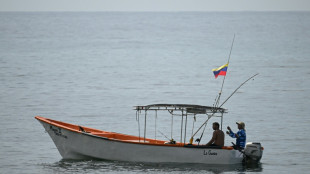
-
 Nissanka ton in vain as India edge Sri Lanka in Super Over
Nissanka ton in vain as India edge Sri Lanka in Super Over
-
An Aussie tycoon bets billions on cleaning up iron ore giant

-
 Civil defence says 50 killed in Gaza as Netanyahu vows to 'finish job' against Hamas
Civil defence says 50 killed in Gaza as Netanyahu vows to 'finish job' against Hamas
-
Canada's Corrigan leans on Olympic experience in quest for Women's Rugby World Cup gold

-
 Kolisi warns 'resilient' Boks are braced for Puma mauling
Kolisi warns 'resilient' Boks are braced for Puma mauling
-
Fearing US invasion, Venezuela to hold emergency drills

-
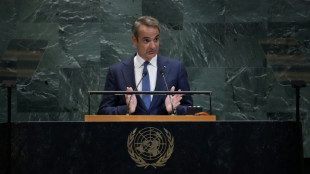 Greek PM warns Israel risks losing friends
Greek PM warns Israel risks losing friends
-
Pakistani PM appeals for India talks, hails Trump role
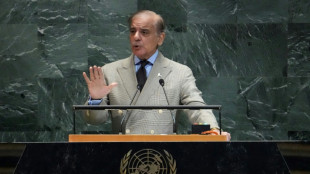
-
 Trump aims to make America great again amid Ryder Cup woes
Trump aims to make America great again amid Ryder Cup woes
-
Trump arrives at Ryder Cup with US seeking comeback

-
 Europe grabs 3-1 lead as US seeks Trump boost at Ryder Cup
Europe grabs 3-1 lead as US seeks Trump boost at Ryder Cup
-
Lufthansa planning thousands of job cuts: sources

-
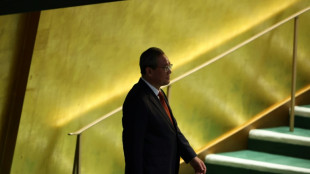 China at UN warns of return to 'Cold War mentality'
China at UN warns of return to 'Cold War mentality'
-
England great Alphonsi expects Canada to shine in Women's Rugby World Cup final

-
 Tottenham reject interest in reported record £4.5bn sale
Tottenham reject interest in reported record £4.5bn sale
-
Man Utd boss Amorim admits uncertainty ahead of Brentford clash

-
 Zverev wins Beijing opener as Gauff launches title defence
Zverev wins Beijing opener as Gauff launches title defence
-
Barca duo Raphinha, Joan Garcia injured, out for PSG clash

-
 Trump hopes more opponents to be charged after 'dirty cop' Comey
Trump hopes more opponents to be charged after 'dirty cop' Comey
-
US Fed's preferred inflation gauge rises, with more cost pressures expected

-
 Facebook, Instagram to offer paid ad-free UK subscriptions
Facebook, Instagram to offer paid ad-free UK subscriptions
-
Former UK PM Blair could lead transitional authority in Gaza: reports

-
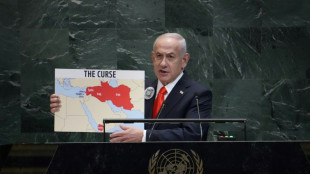 Netanyahu says Palestinian state would be 'national suicide' for Israel
Netanyahu says Palestinian state would be 'national suicide' for Israel
-
The nations and firms threatened by Trump's pharma tariffs

-
 Trailblazing rugby chief Griffin proud of 'incredible' strides for women's game
Trailblazing rugby chief Griffin proud of 'incredible' strides for women's game
-
Brother of Oasis stars denies rape, other charges

-
 EU steps up 'drone wall' plans after Russian incursions
EU steps up 'drone wall' plans after Russian incursions
-
Kenyan jeans factory to fire workers as US deal expires
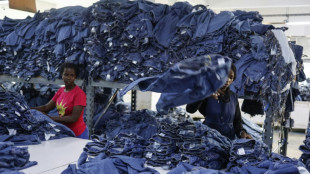
-
 Arteta hails Saliba's impact as new Arsenal deal looms
Arteta hails Saliba's impact as new Arsenal deal looms
-
England's Jones channels grief in bid for Women's Rugby World Cup glory

-
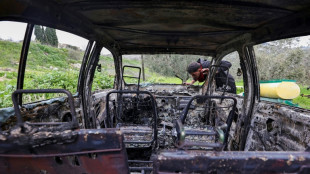 UN identifies 158 firms linked to Israeli settlements
UN identifies 158 firms linked to Israeli settlements
-
Canada's Patrick Watson channels dread into new 'Uh Oh' album


Spain says 'overvoltage' caused huge April blackout
A major power outage that paralysed the Iberian Peninsula in April was caused by "overvoltage" on the grid that triggered "a chain reaction", according to a government report released Tuesday.
The blackout had "multiple" causes, Ecological Transition Minister Sara Aagesen told reporters, adding the system "lacked sufficient voltage control capacity" that day.
Overvoltage is when there is too much electrical voltage in a network, overloading equipment. It can be caused by surges in networks due to oversupply or lightning strikes, or when protective equipment is insufficient or fails.
When faced with overvoltage on networks protective systems shut down parts of the grid, potentially leading to widespread power outages.
Aagesen singled out the role of the Spanish grid operator REE and certain energy companies she did not name which disconnected their plants "inappropriately... to protect their installations".
She also pointed to "insufficient voltage control capacity" on the system that day, due in part to a programming flaw, stressing that Spain's grid is theoretically robust enough to handle such situations.
Due to these misjudgements "we reached a point of no return with an uncontrollable chain reaction" that could only have been managed if steps had been taken beforehand to absorb the overvoltage problems, she added.
"What we're talking about here is an analysis report, it's not any kind of trial. It set out to determine the causes and to make recommendations," the minister said when asked if the head of the grid operator should resign.
Authorities had scrambled to find answers after the April 28 outage cut internet and telephone connections, halted trains, shut businesses and plunged cities into darkness across Spain and Portugal as well as briefly affecting southwestern France.
Spanish Prime Minister Pedro Sanchez announced the formation of an inquiry commission led by the ecological transition ministry shortly after the blackout, urging residents not to speculate until detailed results were available.
He had warned that the probe's conclusions could take several months, given the complexity of the incident.
The government, which has been mired in a corruption scandal involving a close aide of Sanchez, sped up the timeline in recent days.
The commission of inquiry has met three times since Friday to prepare the publication of the report.
- 'Deficiencies' -
Following the outage, several hypotheses were considered to explain the blackout, including a cyberattack and a grid failure caused by excess renewable energy production.
These theories were again dismissed on Tuesday by Aagesen, who nonetheless acknowledged that "vulnerabilities" and "deficiencies" had been identified in Spain's power grid security systems.
The right-wing opposition has questioned the Socialist-led coalition government's phase-out of nuclear energy and reliance on renewables, saying they made Spain more vulnerable to blackouts.
But the government says there is no evidence to suggest "an excess of renewables or the lack of nuclear power plants" caused the crisis.
Among the report's recommendations is the need for stronger supervision and compliance requirements on operators, increasing the country's overall electrical capacity and boosting Spain's electricity connections with neighbouring countries.
The blackout exposed Spain and Portugal's relative lack of interconnections, with support from France and Morocco playing an important role in restoring power.
The European Investment Bank on Monday announced 1.6 billion euros of funding for a major electricity interconnection between France and Spain, which will almost double power exchange capacity.
K.Hofmann--VB
